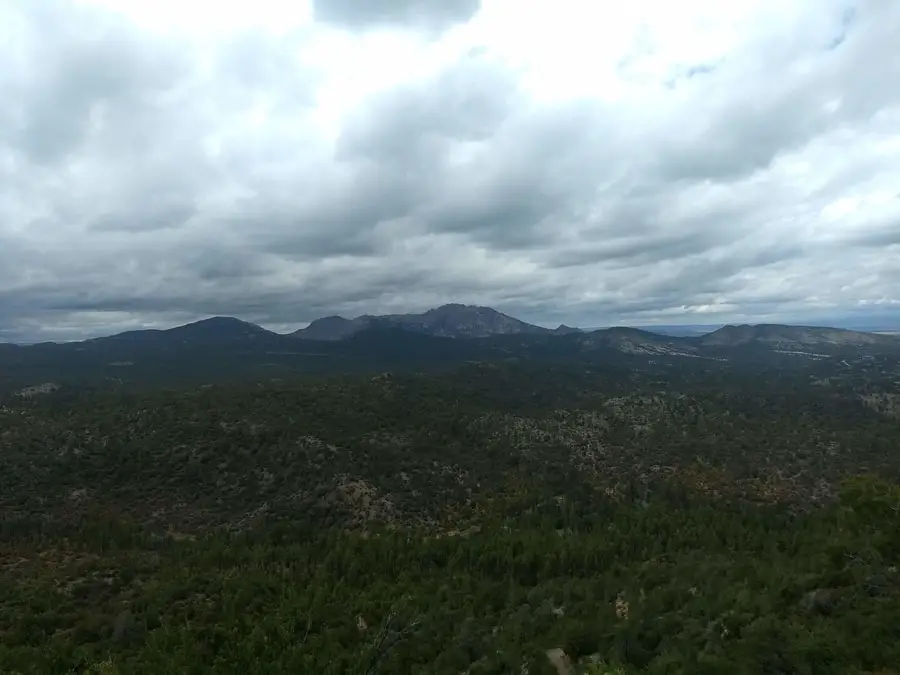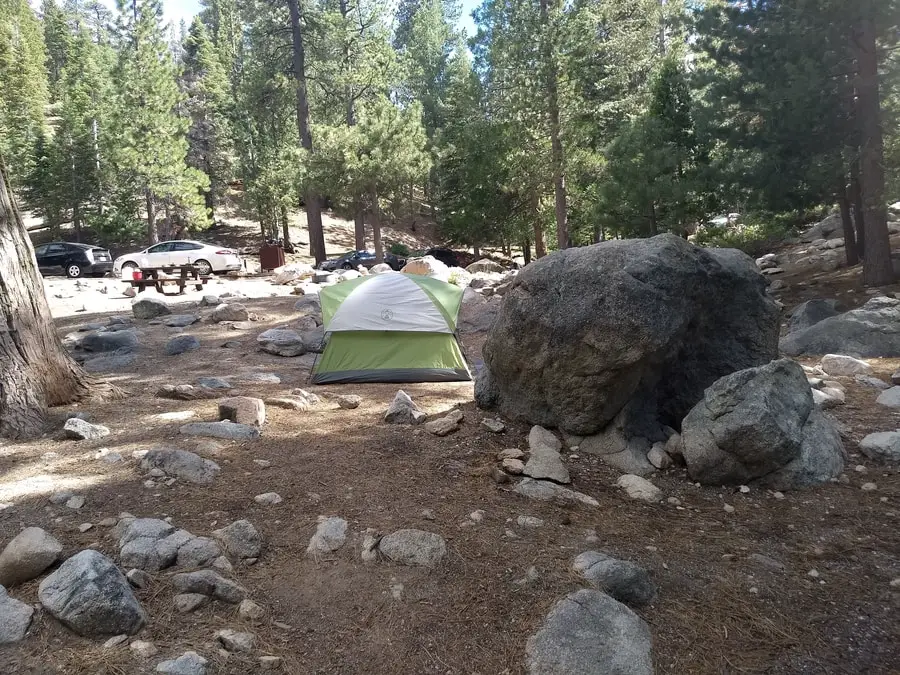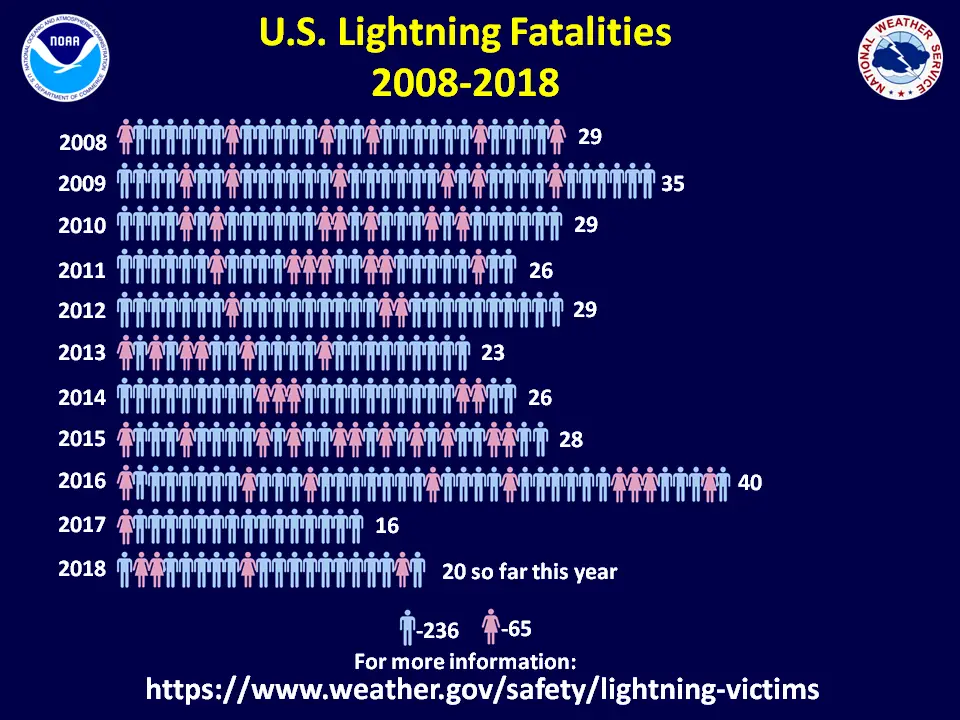
On one of my last camping trips, I noticed the clouds coming in fiercely. I knew that I was in for a nice storm full of rain, thunder, and most notably lightning. I knew some of the basic guidelines for camping with lighting nearby, but I wondered if my tent was considered to be grounded. So I did the research and put it all together here.
So, are tents grounded? Tents are generally not grounded properly since they are temporary structures with no lightning protection system built-in like permanent buildings usually have.
So while tents are not properly grounded, usually you have nothing to fear if you follow basic lightning safety protocols. It is also important for you to know what ground is when we talk about lightning and electricity in general.
By the way, If you are in the market for a new tent, then you should click here to see the one I recommend on Amazon.
to see the one I recommend on Amazon.
What Does “Grounding” Mean?
Before we get started I just want to mention that I have written an article regarding lightning and tent camping in the past that you can read here. I will be referring to that article that I wrote frequently and so it may be beneficial for you to read that article as well as this one. Much of what I discuss here will be similar to what I have already written in that article.
So, what is ground when it comes to lightning and electricity? Well, “ground” refers to an electrical connection to the earth. The “ground” is referring to the return path for electricity to return to earth. It comes in many shapes and sizes, but it is universally well known as a direct physical connection to the earth itself.
I first learned about ground when I worked as an electrician on aircraft. All basic functioning electrical circuits need a ground. The basic electricity diagram consists of a source (where electricity is coming from) a load (what is using that electricity) and a ground (the return path for that electricity to earth).
It’s also important to know that electricity is lazy. It wants to take the path of least resistance. It wants to complete the circuit with the easiest and most direct path. It is the main reason why birds on a powerline do not get electrocuted. The electricity knows that the power lines are a much better and easier path to complete their circuit.
Your tent is most likely not connected to the earth very well and so your tent is usually not the first thing that lightning goes for. However, that does not mean a tent is safe in a lightning storm, there are still many things you need to know to stay safe in a lightning storm while camping.
Can You Ground A Tent?
Attempting to ground a tent is too risky to advise someone to do so. A much safer option would be to follow the rule of “when thunder roars, go indoors”. You are much better in a fully enclosed and substantial structure than you could ever me in your tent, even if you attempted to ground it.
Alternatively, if there is no stable large structure nearby, the next best option is to go inside of a hardshell vehicle with everything closed and windows rolled up. I will discuss this in more detail below.
Where To Set Up Your Tent To Minimize The Risk Of A Lightning Strike

Preparation for the worst is the best thing you can do in order to minimize your risk of a lightning strike when you are camping. Here are some tips for setting up your tent in the right place:
Avoid Camping When Storms Are Predicted
The best thing to do is to avoid camping when you know that the weather is predicted to forecast a thunderstorm in the first place.
Avoid High Areas
Lighting is more prone to strike in higher areas, especially if you or your tent is among the tallest objects present. Try to stay away from camping on top of hills, ridges, peaks, etc. Instead, try to find a place with more natural shelter like trees.
Avoid The Tallest Trees
Higher objects like taller trees are more likely to attract a lightning strike. Camping near trees is fine, but the tallest ones present a higher risk. A Tree struck with lightning could send electrical ground waves that could prove fatal.
Avoid Wide Open Spaces
If you are camping in the middle of a large meadow or clearing then you could be the tallest object and therefore the easiest object for lightning to make its way into the ground, that’s not good.
What To Do If You Are Camping In A Lightning Storm
If you are caught in a lightning storm on a camping trip then there are some things that you can do to minimize your risk of being struck by lightning. Just know that your tent is not a safe structure that will protect you from lightning. Here are some things you should do if you are caught camping in a lightning storm:
Go Inside A Modern Building
A large building or structure with modern wiring and plumbing works well at taking electricity and sending it to ground. Indoors is your best option, but we know that this isn’t always available when you are camping. An outhouse does not provide the same protection as a fully established building.
Go Inside A Fully Enclosed Vehicle
If you do not have a substantial building to enter, the next best option is to go inside of your vehicle and close everything up. A fully enclosed vehicle with a hard shell is what I am referring to, convertibles with soft shells are not as safe for a lightning strike.
Do Not Lay Down Inside Your Tent
If you do not have access to either a modern building or fully enclosed vehicle then you could stay in your tent and away from the outside, but you should not lay down in your tent. This is because doing so puts more of your body closer to the ground and therefore increases your risk for ground current to go through you. A lightning strike nearby could travel through the surface of the ground and still go through your body. You want to have as little contact with the ground as possible.
Remember To Place Outdoors Is Safe From Lightning
You could know all the best tips for minimizing your risk, but you are never safe from lightning outside, unfortunately. However, it is fortunate that death from lightning is very unlikely to happen. According to Weather.gov lightning kills an average of 49 people each year in the United States.
lightning kills an average of 49 people each year in the United States.
Plus only about 10% of people who are struck by lightning are actually killed. They put the odds of being struck in any given year at 1/1,222,000. So while it is of least concern, it is never bad to educate yourself on basic lightning safety as you have done by reading this article.
What To Do After A Lightning Storm
Hopefully, you are indoors in a safe location during the storm. You should not assume it is safe to go outside if you haven’t heard any thunder for a while. Wait at least 30 minutes before leaving the safety of a building or your vehicle after you have last seen or heard lighting and thunder. Check to make sure that everyone is okay and go about having fun on your trip.
Is Lightning A Huge Risk While Camping?

Lighting is more of a risk while camping than it is when you are at home, that is just simply because being outside is where the risk of being struck by lightning is. However, it is not something you should really worry about too much, and it is not something that should keep you from camping when the weather is good.
Common sense should tell you not to purposely go camping or hiking when there is a storm. By now you should have the knowledge on what to do if you are caught in a storm. Just to ease your mind, you should know that your risk of dying in an automobile accident to or from your camping trip is much more significant at 1/103 according to Injuryfacts.nsc.org . Happy camping!
. Happy camping!
Related Questions:
Are you safe from lightning in a tent?
You are not safe from lightning in a tent. Seek a modern substantial building with modern plumbing and wiring if at all possible, or go inside of a fully enclosed vehicle for the duration of the storm and for at least 30 minutes after it passes.
Do tents attract lightning?
Tents generally do not attract lightning unless they are the tallest object in a clear field or the highest object on a peak or ridge. Minimize lightning danger by setting up camp in lower-lying areas next to taller objects, but not next to the tallest object or isolated objects.
My Favorite Camping Gear
- Air Mattress: click here
 to check out my favorite on Amazon.
to check out my favorite on Amazon. - Tent: click here
 to see my favorite tent available on Amazon.
to see my favorite tent available on Amazon. - Sleeping Pad: click here
 to check out the one I love on Amazon.
to check out the one I love on Amazon. - Sleeping Bag: click here
 to see the one I recommend on Amazon.
to see the one I recommend on Amazon. - Camping Stove: click here
 to see the best camping stove on Amazon.
to see the best camping stove on Amazon.


